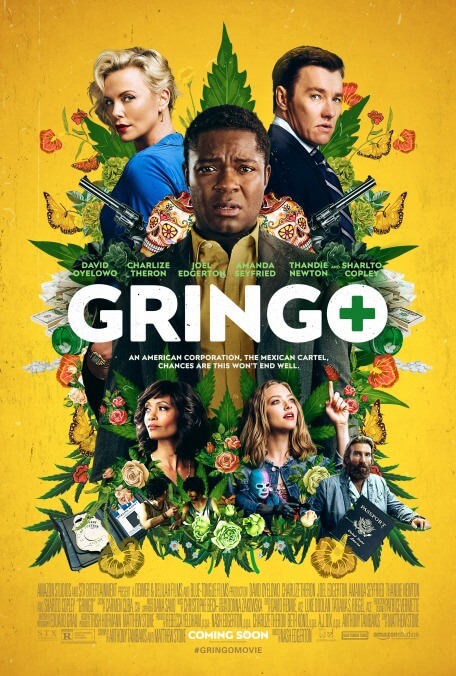Devised by screenwriter Matthew Stone, who helped adapt a Dave Barry novel into Barry Sonnenfeld’s similarly supersized Big Trouble (a forgotten ensemble caper that Gringo often resembles), the plot is shaggy and zigzaggy and overstuffed. At its center is Harold (David Oyelowo), a broke, browbeaten, and literally cucked corporate workhorse, more or less introduced singing along to “Gettin’ Jiggy Wit It” on his morning commute, just to emphasize how profoundly uncool he is. Harold works for a shady pharmaceutical company, exploited by his backstabbing bosses, the Crossfit bro Richard (the director’s actual bro, Joel Edgerton), whom he mistakes for a friend, and venom-tongued co-president Elaine (Charlize Theron). Cartoon scoundrels who spew a showboating stream of racist zingers (“Speak Mexican”) and Gordon Gekko platitudes (“Guilt is for losers”), the two are plotting a big merger that will result in some heavy layoffs—and it’s during a business trip to Mexico that Harold discovers that both his marriage and his job are on borrowed time.
Stone’s story hinges, ostensibly, on what happens next—the scheme this meek underdog cooks up to game his treacherous superiors and solve his money problems. But Gringo, which dusts off that shopworn gimmick of beginning out of sequence with a scene from the middle, piles on subplots and zany side developments as it leaps back and forth across the border. There’s an American record-store clerk (Harry Treadaway) on an amateur smuggling operation in Mexico, unbeknown to the girlfriend (Amanda Seyfried) he’s brought along, and also Richard’s atheist, ex-mercenary brother (Sharlto Copley), who gets mixed up at the intersection of a real and a fake kidnapping. In the most blatantly Tarantino touch, the scary cartel kingpin (Carlos Corona), who goes by The Black Panther, quizzes his potential victims with questions about The Beatles. (He thinks St. Pepper’s is overrated.) Meanwhile, back in Chicago, Harold’s unfaithful wife (Thandie Newton) finds herself caught in a love triangle.
Edgerton’s last movie, the aforementioned The Square, kept a lot of balls in the air, too, and also let them orbit a fairly straitlaced protagonist. But in place of that film’s effective noir revival, Gringo substitutes a baggy chaos of amoral hijinks and coincidental run-ins, set to a funky Christophe Beck score that labors hard to invest the proceedings with the snap and cool of, say, Out Of Sight. Real Leonard adaptations, however, tend to boast sharper, funnier lowlifes, to say nothing of the uneasy way the author used violence to shockingly puncture the good-times vibe. The pleasures of Gringo, such as they are, come down mostly to the opportunity it affords its cast to comically cut loose. Harold may not be much of a character (his is a standard zero-to-hero arc), but it’s enjoyable enough seeing the Selma star—using something close to his real accent for once—drop his trademark reserve to do some broad, panicked shtick, as during the phony hostage routine he performs over the phone. Theron, too, runs with her stock role, even finding a few notes of nuance in the table-turning corporate vamp she’s playing. These gabby genre throwaways could usually be counted on for at least a couple of fun performances. Gringo is no different.


 Keep scrolling for more great stories from A.V. Club.
Keep scrolling for more great stories from A.V. Club.